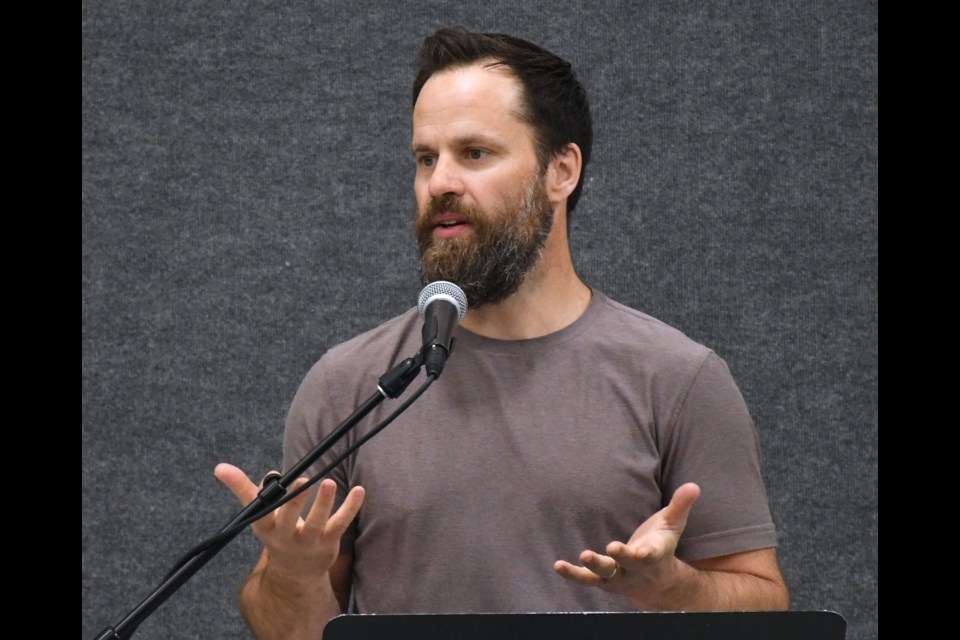MOOSE JAW — A spirit of compassion and collaboration was on full display at the “Brunch and Learn” event co-hosted by Square One Community Inc. and the Rotary Club of Moose Jaw Wakamow recently.
The event included a homemade breakfast provided by the Rotary Club, followed by several organizations sharing a few highlights of their work supporting Moose Jaw’s vulnerable individuals.
Rachel Mullens, founder of Hope Ministries, shared how a sudden gap in services led to the creation of her organization.
“Hope Ministries was developed out of a need in the community,” Mullens said at the brunch event. “Our mission is to share the love of Jesus by ensuring everyone has access to nutritious meals and a safe, welcoming environment where they can find support, resources, and a sense of belonging.”
Hope Ministries currently provides lunches three times a week and suppers on five nights of the week, relying heavily on community donations. Mullens said the next goal is securing a permanent space to expand their programming.
Melanie Braaten of Zion United Church spoke about how the congregation rallied to provide hot meals to the unhoused after hearing a plea for help more than three years ago.
“Within a couple of weeks, we had about 10 volunteers working under Jody Oakes’ leadership,” Braaten said. “Over the past three years, we’ve prepared over 130 hot meals, feeding an average of 65 to 70 people per week.”
These efforts are supplemented by generous contributions from local gardens and residents, including hundreds of peanut butter and jam sandwiches made by volunteers.
Joel Mowchenko of St. Aidan Anglican Church discussed how the team stepped up during the COVID-19 pandemic by launching a weekend lunch program.
“We’ve served every Saturday and Sunday since COVID, (which is) about 100 lunches per weekend — that’s close to 25,000 lunches,” Mowchenko said. “We really try to make a good sandwich to show people dignity and value.”
He emphasized the importance of partnerships with organizations like Community Connections to extend this support.
Sharla Sept, executive director of Hunger in Moose Jaw, painted a vivid picture of that organization’s growing impact.
“Thirty years ago, we served 60 children a week. Today, we’re feeding between 460 and 480 a day,” she said. “It’s about more than just food — we’re offering gardening programs, cooking classes, and preschool education to help families build resilience.”
Sept proudly shared that Hunger in Moose Jaw recently received a Moose Jaw Business Excellence (MJBEX) award for this community impact.
Expanding on the theme of building community through dignity and care, Crystal Peterson, manager of Willow Lodge, expressed her gratitude for the collective spirit in the room.
“It just feels so lovely to be in a room of people who believe not only in Moose Jaw… but (in) our most vulnerable population in Moose Jaw,” she said.
Willow Lodge offers emergency shelter with 15 low-barrier beds, providing not just a safe place to sleep, but access to showers, laundry facilities, and hot meals.
“Everybody needs and deserves a place to sleep. Everybody deserves and needs a plate (of food), a full belly, and that’s what we do,” Peterson said. “We keep… 15 people safe off the streets at night, so that during the day they can be well rested, hold their heads up high, and see a better day.”
Peterson stressed the importance of seeing the humanity behind every individual seeking help.
“If you really get to know someone’s name and their story, and if you get to understand why they are where they are, (you find that) they deserve so much more than a finger pointed (at them) and laughter (when they) cross the street.”
Lindsay Wilcox, representing the John Howard Society of Moose Jaw, described how its programs work in partnership with Willow Lodge to support those transitioning from homelessness to independence.
“The growth that we’ve seen within John Howard in the last three to five years has been a lot,” Wilcox said. “It has really been awesome to see the different supports that we’re able to offer people.”
Through initiatives such as the My Place program and a sober living house, John Howard helps individuals dealing with addiction, mental health challenges, and housing insecurity work toward independent living.
Maxton Eckstein, general manager of Square One, closed the event by celebrating the launch of the new supportive housing program.
“We found a minimum of over 120 people in the community without a home,” Eckstein said, referring to the 2024 Point-in-Time count. “Now, 10 participants are housed and receiving intensive daily support through our Housing First model.”
He emphasized that while funding and facilities are critical, it’s the therapeutic relationships — the unconditional, supportive bond between staff and participants — that drives true recovery.
“We are working really hard to make homelessness history here in Moose Jaw,” Eckstein said. “We really are ahead of the game, and I think we are a role model for other small, rural communities.”
One message was consistent throughout the event: while no single organization can solve complex, systemic issues alone, together, they can help build a more compassionate city.
Square One co-founder Della Ferguson quoted Pope Francis to summarize the spirit of the event in her closing remarks, saying “The measure of the greatness of society is found in the way it treats those most in need, those who have nothing apart from their poverty.”




